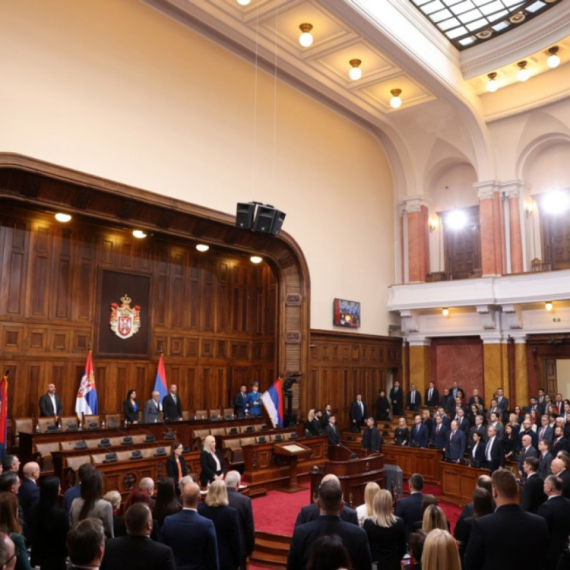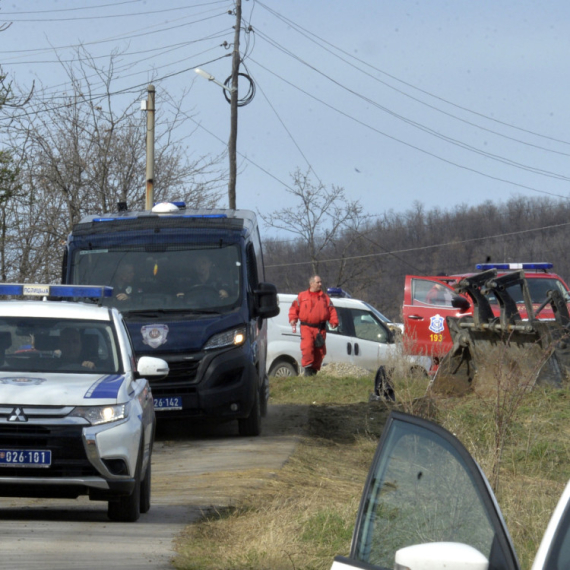CoE debates Kosovo crisis
There was little change in position at the latest debate in the CoE Parliamentary Assembly on the implications of Kosovo’s unilateral independence.
Thursday, 17.04.2008.
09:09

There was little change in position at the latest debate in the CoE Parliamentary Assembly on the implications of Kosovo’s unilateral independence. Kosovo was only included in the agenda at a late stage. CoE debates Kosovo crisis Before the debate itself, it was announced that the body was divided over the question of Kosovo independence, and that no document would be adopted after the debate. Nonetheless, representatives of the Serbian delegation took the opportunity to warn their European colleagues of the possible consequences of the declaration of independence. Council of Europe (CoE) member-states that had recognized Kosovo viewed it as unique case, while those that had not called it a violation of international law and adopted resolutions, and warned of a possible escalation of violence in the region. Although the Swedish representative, who had asked for this emergency debate, called for a debate on how to help the Kosovo people, and on how to enhance life in the province, the debate soon took a political turn. Lord Russell-Johnston, who was a rapporteur on Kosovo, said that the background of today’s complicated situation was the “harsh and cruel,” saying that it had been brought about by “Milosevic’s savage war.” Russell-Johnson, a member of the Democrat and Liberal Alliance for Europe, said that in his report in 2006, he had envisaged the Martti Ahtisaari Plan for supervised independence, and protection of the Serb minority and its cultural heritage. Deeming the Ahtisaari Plan to be the only sustainable solution, he said that his report had foreseen the Kosovo parliament’s decision, and expressed his sadness that a solution could not have been found via negotiations. In response, Serbian delegation member Dragoljub Micunovic, during his address to the Council, stressed that, in his opinion, there were three implications to the unilateral declaration of independence—a brutal violation of international law and basic documents and resolutions; the break-up of Serbia at a time when Europe was moving to ever closer integration; and security, as the third implication. "In Balkan history, the great powers have oftened redrawn frontiers, and there have always been injustices. Every time a deficit of justice emerges, so too will an excess of violence. That's historical logic," Micunovic warned. Reiterating that Belgrade had offered the Kosovo Albanians wide autonomy that Pristina had rejected, he wondered "why don't the Serbs then have the right to self-determination not just in Kosovo, but in Bosnia too?" Konstantin Kosachov of the European Democratic Group said that the Kosovo parliament's decision was "a brutal violation of international law." Kosachov said that Kosovo separatism could inspire other similar movements around the world and criticised those who supported Kosovo independence, as, through their backing, the Albanian side had been encouraged to stand its ground, and thus doom negotiations to failure. Head of the Serbian delegation Milos Aligrudic stressed that over 20 CoE member-states that had recognized Kosovo’s independence, had contravened a resolution on Kosovo that the Council’s Parliamentary Assembly had adopted previously. Aligrudic said that the unilateral declaration of independence set "a dangerous precedent" which threated the democratization process, as well as the region's security. He repeated that Serbia would never recognize the province's independnece, and called the declaration "illegal and immoral." The Parliamentary Assembly reconvenes today to review a report on each member-state's progress in meeting their commitments to the Council. French Foreign Minister Bernard Kouchner will address MEPs. The CoE's spring session ends tomorrow.
CoE debates Kosovo crisis
Before the debate itself, it was announced that the body was divided over the question of Kosovo independence, and that no document would be adopted after the debate. Nonetheless, representatives of the Serbian delegation took the opportunity to warn their European colleagues of the possible consequences of the declaration of independence.Council of Europe (CoE) member-states that had recognized Kosovo viewed it as unique case, while those that had not called it a violation of international law and adopted resolutions, and warned of a possible escalation of violence in the region.
Although the Swedish representative, who had asked for this emergency debate, called for a debate on how to help the Kosovo people, and on how to enhance life in the province, the debate soon took a political turn.
Lord Russell-Johnston, who was a rapporteur on Kosovo, said that the background of today’s complicated situation was the “harsh and cruel,” saying that it had been brought about by “Milošević’s savage war.”
Russell-Johnson, a member of the Democrat and Liberal Alliance for Europe, said that in his report in 2006, he had envisaged the Martti Ahtisaari Plan for supervised independence, and protection of the Serb minority and its cultural heritage.
Deeming the Ahtisaari Plan to be the only sustainable solution, he said that his report had foreseen the Kosovo parliament’s decision, and expressed his sadness that a solution could not have been found via negotiations.
In response, Serbian delegation member Dragoljub Mićunović, during his address to the Council, stressed that, in his opinion, there were three implications to the unilateral declaration of independence—a brutal violation of international law and basic documents and resolutions; the break-up of Serbia at a time when Europe was moving to ever closer integration; and security, as the third implication.
"In Balkan history, the great powers have oftened redrawn frontiers, and there have always been injustices. Every time a deficit of justice emerges, so too will an excess of violence. That's historical logic," Mićunović warned.
Reiterating that Belgrade had offered the Kosovo Albanians wide autonomy that Priština had rejected, he wondered "why don't the Serbs then have the right to self-determination not just in Kosovo, but in Bosnia too?"
Konstantin Kosachov of the European Democratic Group said that the Kosovo parliament's decision was "a brutal violation of international law."
Kosachov said that Kosovo separatism could inspire other similar movements around the world and criticised those who supported Kosovo independence, as, through their backing, the Albanian side had been encouraged to stand its ground, and thus doom negotiations to failure.
Head of the Serbian delegation Miloš Aligrudić stressed that over 20 CoE member-states that had recognized Kosovo’s independence, had contravened a resolution on Kosovo that the Council’s Parliamentary Assembly had adopted previously.
Aligrudić said that the unilateral declaration of independence set "a dangerous precedent" which threated the democratization process, as well as the region's security.
He repeated that Serbia would never recognize the province's independnece, and called the declaration "illegal and immoral."
The Parliamentary Assembly reconvenes today to review a report on each member-state's progress in meeting their commitments to the Council.
French Foreign Minister Bernard Kouchner will address MEPs. The CoE's spring session ends tomorrow.



















































Komentari 12
Pogledaj komentare